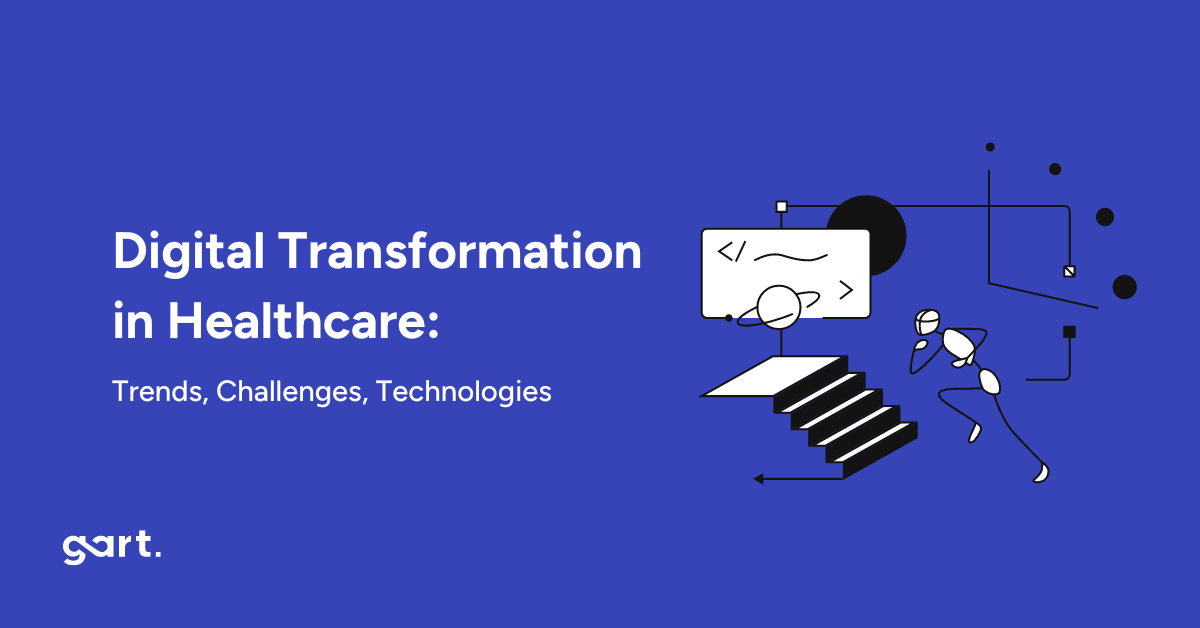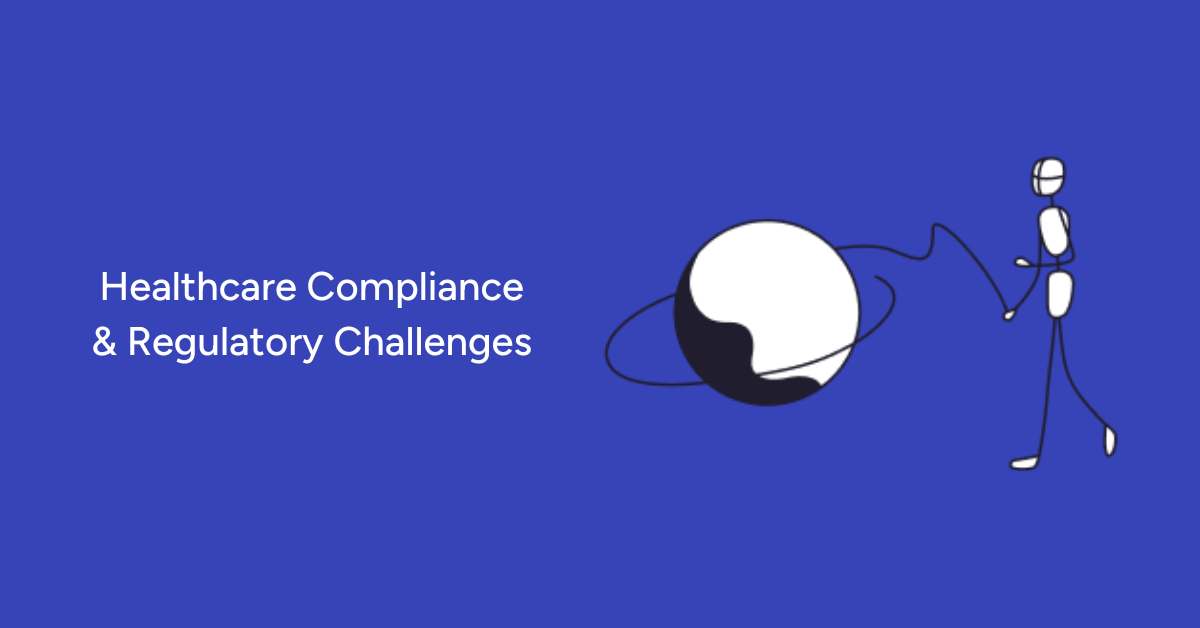Healthcare greatly benefits from a digital transformation. Technological advancements have ushered in an era where digital healthcare solutions are enhancing patient outcomes and experiences.
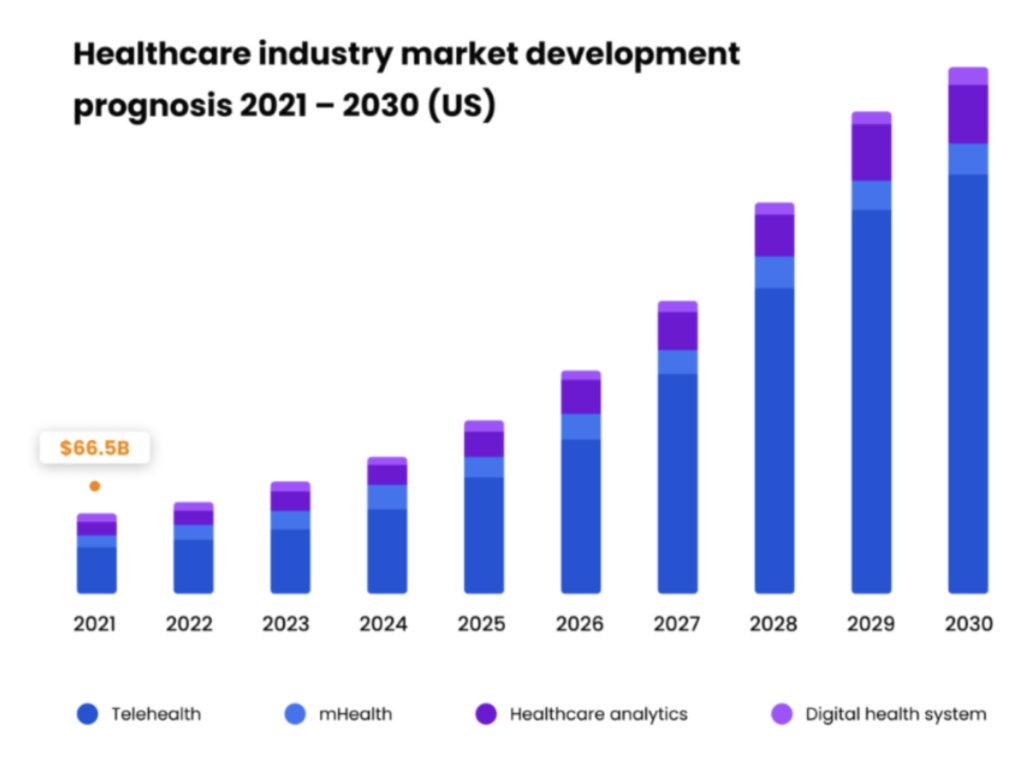
A report by Statista shows that the digital transformation trend will only grow in the future.
88% of healthcare technology leaders prioritize improving the patient experience in their investments (according to a Deloitte survey)
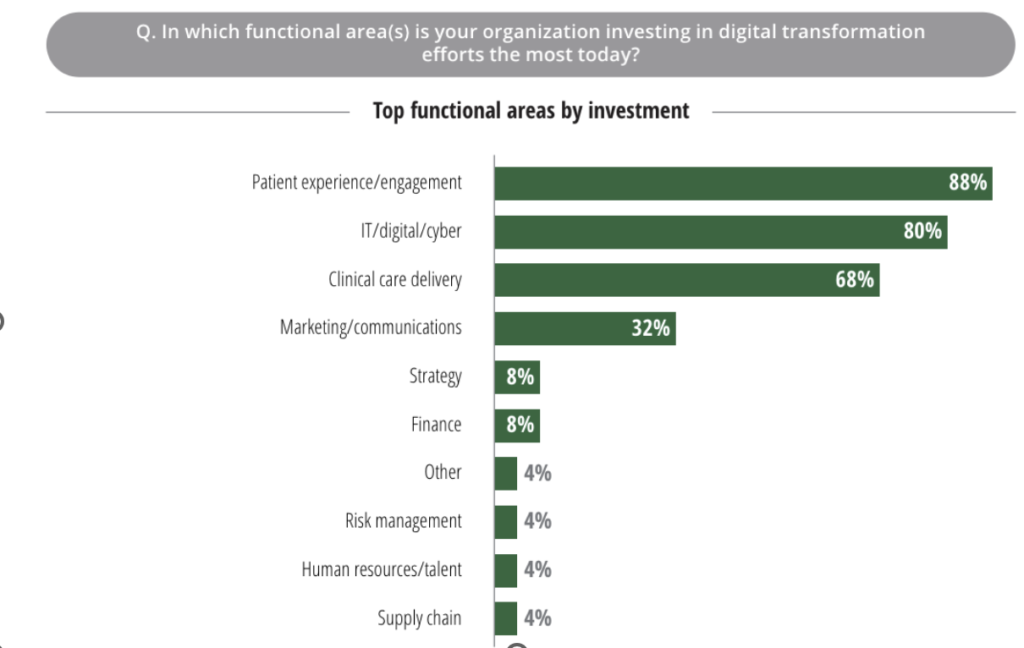
By 2025, the global digital healthcare market is projected to reach $504.4 billion, highlighting the industry’s recognition of the transformative potential of digital solutions. This shift underscores the necessity for healthcare professionals, including doctors, nurses, and administrative staff, to stay abreast of ongoing digital advancements.
Key Drivers of Digital Transformation in Healthcare
Several factors drive the digital transformation in healthcare, including:
A) Emerging Technologies like AI, IoT, Big Data
Technological innovations like artificial intelligence (AI), the Internet of Things (IoT), and big data are pivotal in accelerating healthcare’s digital transformation.
- AI: Automates record-keeping, enhances predictive diagnostics, and personalizes patient treatment plans. AI chatbots are also becoming more common.
- IoT: Health wearables and IoT-connected devices improve real-time patient monitoring and operational efficiency in hospitals.
- Robotics: Medical robots are revolutionizing surgery, enabling advanced procedures remotely.
- 3D Printing: Expands possibilities for creating prosthetics and custom implants, enhancing patient care.
B) Evolving Patient Expectations and Demographics
With over 5.3 billion internet users globally, the demand for digital healthcare services is rising. Telehealth usage surged during the pandemic and continues to grow. Younger demographics, more inclined to adopt digital solutions, are driving this demand.
C) Updated Regulations
Governments worldwide are encouraging digital healthcare adoption through regulations further accelerating the transformation.
HIPAA, GDPR, ISO/IEC 27799 are just a part of the list of compliance standards, that provide guidelines for information security management in health organizations and insurance of the protection of health data.
Gart guides you through every step of the compliance process, providing the expertise, tools, and support you need. Contact Us.
Benefits of Digital Transformation in Healthcare
1. Reduced Costs – automating administrative tasks and other processes allows healthcare providers to save time and money while enhancing patient care. Through digital transformation, workflows are streamlined, and operational efficiency is increased, which helps reduce overhead costs.
2. Optimized Workflow – digital transformation has enabled healthcare providers to optimize their workflows. Automating tasks like patient information management and appointment scheduling allows medical staff to focus more on delivering effective patient care. Additionally, digital tools such as AI-powered chatbots can handle simple patient interactions, reducing the burden on physicians.
3. Enhanced Patient Interaction – digital transformation has empowered healthcare providers to interact with patients more effectively. Innovative technologies enable health professionals to easily access patient records, aiding in better diagnosis and treatment. Moreover, digital solutions like telemedicine allow doctors to offer timely medical advice even when they are not physically present at the hospital or clinic.
4. Improved Administration – digitizing processes makes managing administrative tasks more efficient for healthcare organizations. Automation of activities like scheduling appointments, filing insurance claims, and maintaining accurate financial records reduces manual errors while improving accuracy and speed.
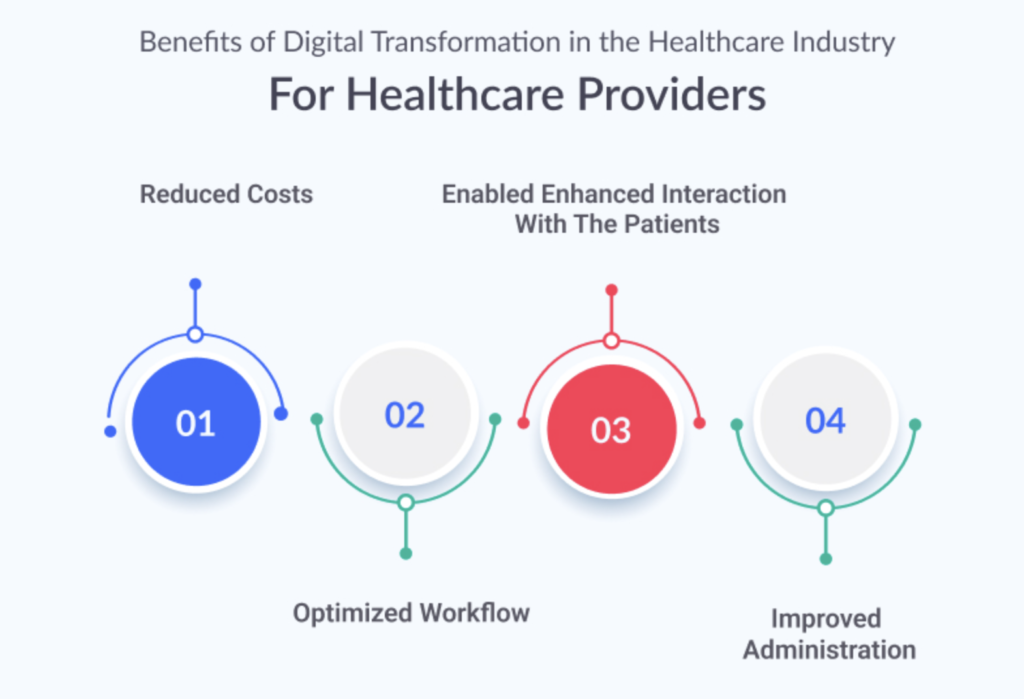
Challenges to Healthcare Digital Transformation
Despite its benefits, digital transformation in healthcare faces several challenges:
1. Data Privacy and Security: Ensuring the security of sensitive patient data is critical.
2. Resistance to Change: Long-established healthcare organizations may be hesitant to adopt transformative technologies.
3. Interoperability Issues: Integrating legacy systems with new digital applications can be challenging.
4. Staff Shortages: Healthcare professionals need to develop digital proficiency, which is happening gradually.
Successful Cases of Digital Transformation in Healthcare
1. Infrastructure Optimization and Data Management in Healthcare
Challenge
A health tech company came with outdated infrastructure that hindered efficient data management and slowed down critical operations. The existing system was not scalable and faced frequent downtimes, affecting the overall patient care experience.
Solution
Gart Solutions implemented a comprehensive infrastructure optimization strategy that included modernizing the existing legacy systems, integrating cloud solutions, ensuring seamless data management (complying with HIPAA regulations) and dynamic scaling.
Learn details from the Case Study.
2. CI/CD Pipelines and Infrastructure for E-Health Platform
Challenge
An e-health platform aimed to accelerate their development process and improve the reliability of their applications. However, they faced significant challenges with manual deployments, which were time-consuming and error-prone, leading to inconsistent performance and delayed updates.
Solution
Gart Solutions designed and implemented CI/CD pipelines tailored to the needs of the e-health platform. This automation of the deployment process not only minimized human error but also significantly reduced the time required to release new features and updates. Also, Gart Solutions optimized the infrastructure to support continuous integration and delivery, ensuring that the platform could handle increased user demand and provide a seamless experience. The implementation of these solutions resulted in faster development cycles, improved application performance, and greater user satisfaction.
Struggling with digital transformation for your healthcare project? Get expert guidance and IT Consultancy for your project free of charge. “Quick wins” – guaranteed. Contact Us.
Conclusion
Healthcare organizations understand that digital transformation is crucial for enhancing healthcare services and strengthening patient relationships. Beyond technology investments, this transformation necessitates a shift in organizational culture and employee engagement, requiring enterprise-wide involvement.
Leading health organizations are adopting six key strategies to advance digitally:
- Establish digital leadership and governance aligned with business strategies.
- Cultivate a digital culture supported by leadership at all organizational levels.
- Develop next-generation talent with a focus on workforce quality and quantity.
- Integrate cybersecurity at all stages for robust risk management.
- Emphasize flexibility and scalability to adapt to evolving technologies.
- Implement measurable, accountable KPIs to track the success of digital initiatives.
Successfully navigating digital transformation in healthcare requires expertise and a business-first approach of IT Consulting.
Gart Solutions can guide healthcare providers through the process of Digital Transformation, accelerating the adoption of digital healthcare technologies and improvement of patient outcomes.
Contact Gart today to learn more about how we can help you solve the challenges of digital transformation in healthcare.
See how we can help to overcome your challenges

